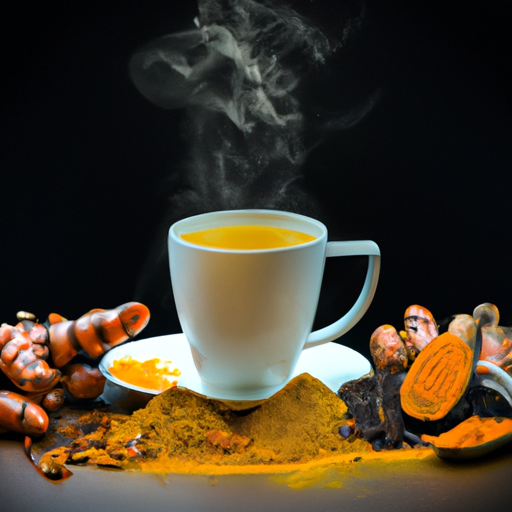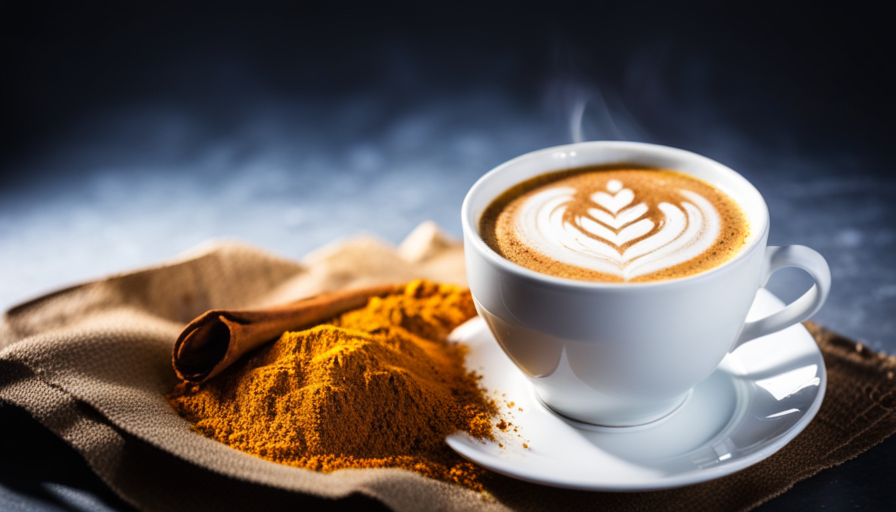Are you interested in reaping the rewards of turmeric tea, but unsure about which type of turmeric to use? Turmeric tea has a long history in traditional medicine for boosting well-being and warding off illness. Curcumin, the active ingredient in this golden spice, is a potent antioxidant and anti-inflammatory compound with a wide range of health benefits.
When it comes to making turmeric tea, you have the option of using either fresh or dried turmeric. Fresh turmeric has a subtle, earthy flavor and can be grated or sliced to infuse your tea with its vibrant color and aroma.
On the other hand, dried turmeric powder is more convenient and easier to store, but it may not have the same potency as fresh turmeric. In this article, we’ll explore the benefits of turmeric tea, the difference between fresh and dried turmeric, and how to choose the best type of turmeric for your tea.
Key Takeaways
- Fresh turmeric has a higher concentration of curcumin, which provides a stronger anti-inflammatory and antioxidant effect and a more vibrant and pungent flavor than dried turmeric.
- Drying turmeric can cause the loss of natural compounds responsible for aroma and flavor, making freshly grated turmeric root a great addition to turmeric tea.
- Black pepper enhances curcumin absorption, while ginger, cinnamon, honey, and lemon can be added for sweetness, flavor, and additional health benefits.
- Choosing high-quality turmeric, whether fresh or powdered, is crucial for obtaining the most health benefits from turmeric tea.
The Health Benefits of Turmeric Tea
Sipping on a warm mug of homemade turmeric tea with a pinch of black pepper can do wonders for your health. Turmeric tea has been used for centuries in traditional medicine for its anti-inflammatory and antioxidant properties.
Research on turmeric tea has shown that it can boost your immune system, promote healthy digestion, and even aid in weight loss. There are many turmeric tea recipes available online, but the simplest and most effective way to make it is to simmer fresh or dried turmeric root in hot water for about 10 minutes.
Adding a pinch of black pepper can help your body absorb the active ingredient in turmeric, called curcumin. Now, let’s talk about the difference between fresh and dried turmeric and which one is best for making tea.
Fresh vs Dried Turmeric
If you’re looking for a more potent and flavorful option, consider using freshly grated turmeric root instead of dried powder for your homemade turmeric tea. Here are some benefits of using fresh turmeric:
- Fresh turmeric root contains a higher concentration of curcumin, the active ingredient responsible for turmeric’s health benefits, than the dried powder. This means that using fresh turmeric in your tea may provide a stronger anti-inflammatory and antioxidant effect.
- Fresh turmeric has a more vibrant and pungent flavor compared to the dried powder, which can be dull and earthy. Using fresh turmeric in your tea can add a refreshing and zesty taste that can enhance your tea-drinking experience.
- The process of drying turmeric can cause the loss of some natural compounds, such as essential oils and volatile compounds, which are responsible for turmeric’s aroma and flavor. Using fresh turmeric ensures that these natural compounds are preserved, providing a richer and more authentic turmeric experience.
Now that you know the advantages of using fresh turmeric in your tea, let’s explore how to use it effectively in the next section.
Fresh Turmeric for Tea
To get the most out of your homemade turmeric tea, you should consider using freshly grated turmeric root, which adds a vibrant and pungent flavor to your drink. Not only does it taste better, but using fresh turmeric also provides numerous health benefits that you won’t get from using dried turmeric powder.
Fresh turmeric is rich in curcumin, the active ingredient responsible for its anti-inflammatory and antioxidant properties. These properties make it a great addition to your daily routine, helping to reduce inflammation, boost your immune system, and improve digestion. To give you a better idea of the benefits of using fresh turmeric for tea, take a look at this table:
| Benefit | Description |
|---|---|
| Anti-inflammatory | Reduces inflammation in the body |
| Antioxidant | Fights free radicals that cause damage to cells |
| Immune Booster | Strengthens immune system |
| Digestive Aid | Improves digestion and reduces bloating |
| Pain Relief | Alleviates pain and discomfort |
| Brain Health | Improves cognitive function and protects against neurological diseases |
Now, if you don’t have access to fresh turmeric, don’t worry. Dried turmeric powder is still a great option for making tea, and we’ll discuss its benefits in the next section.
Dried Turmeric Powder for Tea
Get ready to spice up your cuppa with the versatile and convenient option of using dried turmeric powder in your tea. Not only is it a great way to add flavor to your drink, but it also has numerous health benefits.
Here are a few tips to help you enjoy your turmeric tea:
- Add a pinch of black pepper to enhance the absorption of curcumin, the active ingredient in turmeric.
- Mix in a bit of honey or ginger for added sweetness and flavor.
- Try adding it to your favorite chai tea blend for a unique twist on a classic drink.
Using turmeric in cooking has been a popular practice in traditional medicine for centuries, and for good reason. Turmeric is known for its anti-inflammatory properties and may even have beneficial effects on skin health.
So next time you’re making a cup of tea, consider adding a pinch of dried turmeric powder for an added boost of flavor and potential health benefits.
When it comes to choosing the best type of turmeric for your tea, there are a few factors to consider. Keep reading to learn more about the different types of turmeric and which one may be best for you.
Choosing the Best Type of Turmeric for Your Tea
You might be wondering which turmeric is right for your cup of tea, but fear not, there are plenty of options to choose from. When it comes to turmeric, you have the choice between fresh or powdered.
Fresh turmeric is the root of the turmeric plant and is typically grated or sliced before being used in tea. Powdered turmeric, on the other hand, is made by grinding the dried root and is the more common form used in tea.
When choosing between fresh and powdered turmeric, it ultimately comes down to personal preference and availability. Fresh turmeric may not be as readily available as powdered turmeric and may require more effort to prepare, but it’s believed to have a stronger flavor and more potent medicinal properties. Powdered turmeric, while convenient, may be of lower quality and contain additives. Regardless of which type you choose, it’s important to choose high-quality turmeric to ensure you’re getting the most benefits.
As you consider which type of turmeric to use in your tea, keep in mind that turmeric tea can also be enhanced with other ingredients such as ginger, cinnamon, honey, or lemon. These ingredients not only add flavor but also have their own health benefits.
In the next section, we’ll explore how to incorporate these ingredients into your turmeric tea for maximum wellness benefits.
Using Other Ingredients in Turmeric Tea
If you want to enhance the flavor and health benefits of your turmeric tea, there are many common additions you can use. Adding ingredients like ginger, honey, lemon, and cinnamon can not only make your tea taste better, but also provide additional health benefits.
Ginger is known for its anti-inflammatory properties, while honey is a natural sweetener that also has antibacterial properties. Lemon is a great source of vitamin C, and cinnamon can help regulate blood sugar levels.
Enhancing Flavor and Health Benefits
Boost both the taste and health benefits of your turmeric tea by opting for high-quality, organic turmeric powder. When it comes to enhancing the flavor of your turmeric tea, there are a variety of natural ingredients you can add to the mix.
Here are a few ideas to get you started:
- Add a squeeze of fresh lemon juice to your turmeric tea for a zesty kick and to boost the absorption of turmeric’s active compound, curcumin.
- Sweeten your turmeric tea with a touch of raw honey or maple syrup for a natural, healthy alternative to processed sugar.
- Sprinkle a pinch of black pepper into your turmeric tea to further enhance curcumin absorption and add a subtle warmth to the flavor.
In addition to enhancing the flavor, these additions can also contribute to the overall health benefits of your turmeric tea.
Now that you’ve learned some brewing tips and how to enhance the flavor of your turmeric tea, let’s take a look at some common additions to turmeric tea that can take your cup to the next level.
Common Additions to Turmeric Tea
Now that you know how to enhance the flavor and health benefits of your turmeric tea, it’s time to explore some common additions to take your tea to the next level. Adding different spices or alternative sweeteners can bring a new dimension to your tea, while also providing additional health benefits.
Spice combinations are a great way to create a unique turmeric tea experience. Combining spices such as ginger, cinnamon, cardamom, or black pepper can add a spicy kick to your tea while also providing additional anti-inflammatory and antioxidant properties. Alternatively, adding a touch of honey or maple syrup can sweeten your tea without the negative effects of refined sugar. Here’s a table of some common spice combinations and alternative sweeteners to try in your turmeric tea:
| Spice Combinations | Alternative Sweeteners |
|---|---|
| Ginger and Cinnamon | Honey |
| Cardamom and Black Pepper | Maple Syrup |
| Cloves and Nutmeg | Stevia |
| Vanilla and Star Anise | Agave Nectar |
With these simple additions, you can transform your turmeric tea into a delicious and health-promoting beverage. Now that you’ve learned about the different ways to enhance your tea, let’s move on to the next section and learn how to make turmeric tea at home.
Making Turmeric Tea
Turmeric tea is a popular and delicious way to reap the benefits of this powerful spice. There are many different turmeric tea recipes and brewing techniques out there to try. Some people like to use fresh turmeric root, while others use turmeric powder.
You can also add other herbs and spices like ginger, cinnamon, and black pepper to enhance the flavor and medicinal properties of your turmeric tea. Making turmeric tea is easy. To start, boil water in a small pot or kettle. Add a teaspoon of turmeric powder or a small piece of grated fresh turmeric root to the water and let it steep for 5-10 minutes.
Strain the tea into a mug and add honey or lemon juice to taste. By incorporating turmeric tea into your daily routine, you can experience its many health benefits. But, there are also other ways to incorporate turmeric into your diet.
Incorporating Turmeric into Your Diet
Now that you know how to make turmeric tea, there are other ways to incorporate this powerful spice into your diet. You can add turmeric to your cooking or sprinkle it on roasted vegetables. You can even mix it into a smoothie.
You can also consider taking turmeric supplements to reap its full health benefits. Remember, turmeric has been used for centuries in traditional medicine and is known for its anti-inflammatory and antioxidant properties. So, it’s a great addition to your overall wellness routine.
Other Ways to Use Turmeric
If you’re looking for new ways to incorporate turmeric into your meals, try adding it to soups or stir-fries for an extra boost of flavor and health benefits. Turmeric has been used for centuries in traditional medicine for its anti-inflammatory and antioxidant properties. It has also been used topically in the form of turmeric face masks to help with acne and other skin conditions.
Incorporating turmeric into your diet is a great way to support your overall wellness, but sometimes it can be difficult to consume enough of it through food alone. That’s where turmeric supplements come in.
Turmeric Supplements
By taking turmeric supplements, you can easily reap the health benefits without having to consume large amounts of the spice through food. Turmeric supplements are available in capsule form, making it convenient to incorporate into your daily routine.
Here are some benefits of taking turmeric supplements:
- Turmeric supplements provide a consistent dosage of curcumin, the active ingredient in turmeric, which is important for achieving therapeutic effects.
- Turmeric supplements are a safe and effective alternative to using turmeric in food, especially for those who may not enjoy the taste of the spice.
- Turmeric supplements may help to reduce inflammation, improve brain function, and support heart health.
However, it’s important to note that taking high doses of turmeric supplements may lead to potential risks, such as gastrointestinal issues and blood thinning. It’s recommended to follow the dosage instructions on the supplement label and consult with a healthcare professional before starting a turmeric supplement regimen.
With that being said, let’s move on to the next section about precautions and side effects.
Precautions and Side Effects
Be aware of the potential precautions and side effects of using turmeric for tea. Turmeric is generally considered safe when consumed in moderation, but it can cause stomach upset, diarrhea, and nausea in some people, especially when taken in large doses. It can also increase the risk of bleeding, so it’s important to avoid taking it if you’re on blood thinners or have a bleeding disorder.
To minimize the risk of side effects, it’s best to choose high-quality turmeric that’s organic and free from additives or contaminants. Look for turmeric that’s labeled as "curcumin standardized"or "95% curcuminoids"to ensure that you’re getting a potent and effective product.
Additionally, it’s important to follow the recommended dosage and consult with a healthcare provider if you have any concerns or preexisting medical conditions.
Overall, turmeric is a wonderful natural remedy with many health benefits, but it’s important to use it safely and responsibly to avoid any unwanted side effects.
Frequently Asked Questions
What are some common recipes for turmeric tea?
Looking to reap the benefits of turmeric tea? Try a classic recipe of turmeric, ginger, honey, and lemon. For a twist, add coconut milk or cinnamon. Enjoy the natural remedy for inflammation, digestion, and overall wellness.
Can turmeric tea be consumed while pregnant or breastfeeding?
If you’re pregnant or breastfeeding, it’s important to be cautious about what you consume. While turmeric tea is generally safe, it’s best to consult with your healthcare provider first. Turmeric has anti-inflammatory properties that can promote overall wellness.
Is it safe to consume turmeric tea if you are taking medication?
"Before sipping on that turmeric tea, it’s crucial to consider possible interactions with medication. Consult with your healthcare provider to ensure safe consumption and discuss any medication concerns. Incorporating natural remedies into your wellness routine can lead to overall health benefits."(Possible Discussion Ideas: Turmeric Interactions, Medication Concerns)
How does turmeric tea compare to other teas in terms of caffeine content?
Compared to green tea, turmeric tea has significantly less caffeine. However, turmeric tea offers unique mental health benefits, such as reducing inflammation and improving brain function. Emphasize natural remedies and overall wellness with turmeric tea.
Are there any specific brands of turmeric that are known to be of higher quality for tea making?
For optimal turmeric tea quality, look for brands with high curcumin content and organic certification. Turmeric tea benefits include anti-inflammatory and antioxidant properties, making it a great addition to any wellness routine.
Conclusion
Congratulations on learning about the benefits of turmeric tea and how to choose the best type for your needs! As you incorporate this powerful spice into your daily routine, keep in mind that turmeric should never replace medical treatment for serious conditions. However, it can be a great addition to your overall wellness plan.
Did you know that turmeric has been used for centuries in traditional medicine? In fact, studies have shown that turmeric may have anti-inflammatory properties, support brain function, and even help prevent certain types of cancer. By choosing the right type of turmeric and incorporating it into your diet, you can reap the many benefits of this amazing spice.
Remember, prevention is key when it comes to overall health and wellness. By incorporating natural remedies like turmeric tea into your daily routine, you can support your body’s natural healing processes and stay healthy for years to come. So why not try a cup of turmeric tea today and see how it can benefit you? Your body’ll thank you!










